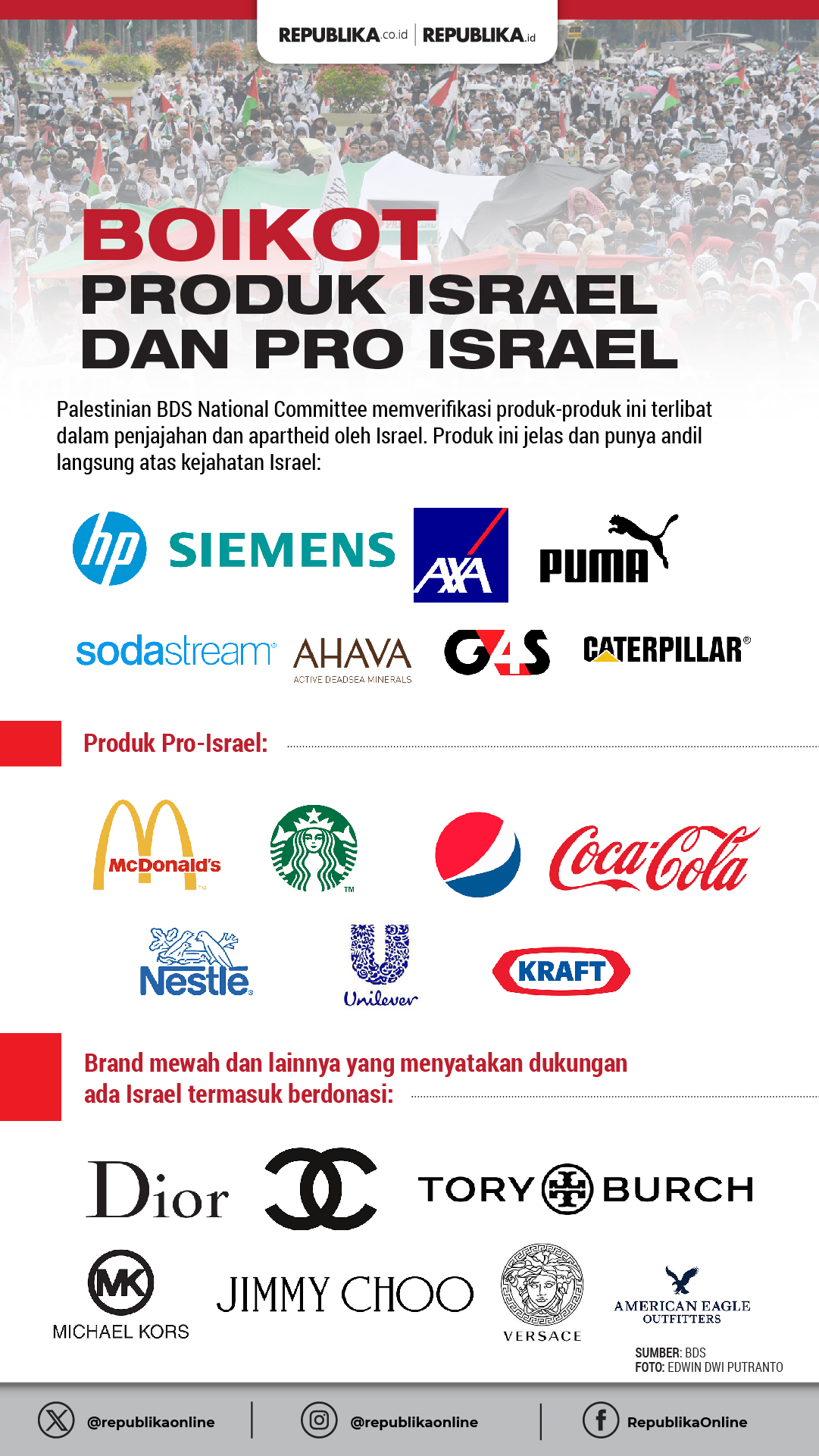JAKARTA -- Movements and calls to boycott Israeli products and their affiliates are growing, including in Indonesia. Legislators even encouraged the government to be assertive in pressuring Israel, one of them by officially boycotting Israeli products in Indonesia.
Member of Parliament's Commission VI from the MCC faction, Amin AK, said that the boycott of Israeli products was a humanitarian gesture to pressure Israel to stop its aggression in Palestine. It is a form of defense against the human values that have been harmed by Israel.
“We in the House of Representatives encourage this boycott movement of Israeli products to become the official stance of the Indonesian Government to be followed by all businesses and society,” Amin told Republika, in Jakarta, Wednesday (8/11/2023).
He said that facts prove that the victims of Israeli attacks today are civilians and that more than two-thirds of the victims of Israeli bombing are women and children. “In fact, Israel heinously bombed hospitals and schools, areas that should not be targeted in warfare,” Amin said.
Amin appreciated the readiness of the Indonesian Association of Retailers and Tenants of Shopping Centers (Hippindo) to boycott Israeli or Israeli-affiliated products if the government has issued an official decree. Amin said that support for the struggle of the Palestinian people is now widespread in various countries, including in European and American countries.
“For the Indonesian nation, the move is a mandate from the NRI Constitution of 1945 that rejects all forms of colonization,” the MCC politician continued.
Since the beginning of independence, Amin said, Indonesians have consistently defended Palestinian independence and rejected Israeli colonization in accordance with the mandate of the constitution, especially the Opening of the NRI Constitution of 1945. From the era of President Soekarno to President Jokowi, the government has also consistently voiced its stance of rejecting Israeli colonization and supporting Palestinian independence.
“For the Indonesian government, the attempt to boycott Israel is not the first. Bung Karno expressly rejected Israel's participation in the Asia Africa Conference in Bandung and the Asian Games in Jakarta in 1962,” Amin said.
Secretary General (Secretary General) of the Indonesian SME Association (Akumindo) Edy Misero said that Akumindo is ready to follow any government decision on the form of support for the Palestinians, including if it should boycott Israeli products. “In the government to date, I have not found a government statement, 'let's boycott Israeli and related products'. Well, this does not exist yet, so we as MSMEs will have difficulty in determining attitudes as long as the government has not provided enough information,” Edy said on Wednesday (8/11/2023).
Edy said the government's stance so far strongly condemns Israel's attacks on Palestinians, including children and the elderly. Meanwhile, on the subject of boycotting pro Israeli products, Edy has not heard of it.
Edy said the boycott decision should be carefully considered so as not to harm the public and domestic businesses. Edy exemplifies the boycott against McD that threatens the survival of workers and MSMEs who supply raw materials to McD.
“This must be understood in order not to be mistaken in taking a stance. But, if we agree as a nation, let's boycott together, the costs that come out (the reduction of workers and the cessation of supplies from MSMEs) will cost us together,” Edy said.
Edy suggested the boycott was more targeted. An example is products that come directly from Israel, such as oranges. “If we boycott citrus from Israel, there will be an impact on Israeli exporters. Domestically it can still be subsidised with local oranges,” Edy said.
Previously, the Association of Retailers and Tenants of Indonesian Shopping Centers (Hippindo) stated that it will continue to sell various products that are being boycotted by the public as long as the products meet the conditions in force in Indonesia. “For boycotted products, the principle as long as suppliers selling to us retail sector are qualified from the government, such as business licenses, BPOM, standardization is correct, yes, we will still sell,” said Hippindo General Chairman Budihardjo Iduansjah.
He continued, Hippindo has not implemented political principles in his business. Even so, Budi insists he will support the government's policy. “If the government bans (the sale of products related to Israel), yes, we will follow. If the government doesn't ban it, we will keep it running,” he said.

Mohammad Faisal, Executive Director of the Center of Reform on Economics (Core), said the boycott would clearly have an impact on the decline in sales of related products. Moreover, he added, the variety of products is indeed worldwide.
“Its products are global and diverse, from technological products to simple ones to food and beverages. It's just that, how far the impact will be depends on the extent to which people adhere to the boycott,” he said.
He added that literacy regarding Israeli products that are willing to be boycotted is also necessary. If the boycott were effective, he said, the impact would be huge. This is because the number of Indonesian consumers is very large. “Especially if the boycott is also carried out by other countries,” he said.
Meanwhile, Minister of Investment or Head of the Investment Coordination Agency (BKPM) Bahlil Lahadalia revealed that the boycott of pro-Israel products carried out by the public had an effect on the realization of investments. However, its influence is not great.
“There is (the influence), but not deep yet. That's because (his boycott action) is new. So, there is even a small one,” Bahlil said when asked by Republika after attending Anugerah Pengasi Investasi (ALI) 2023 in Jakarta, Wednesday (8/11/2023).
Even so, he believes that the 2023 investment realization target of Rp 1,400 trillion is still reached. According to him, the boycott will not affect capital investment until the end of the year. “Until 2023 I think there is no influence of anything. The target of Rp 1,400 trillion remains reached,” he said.


